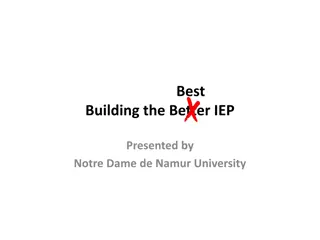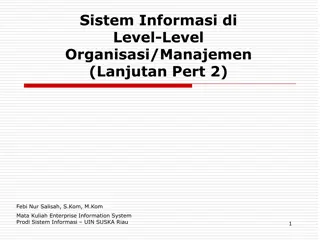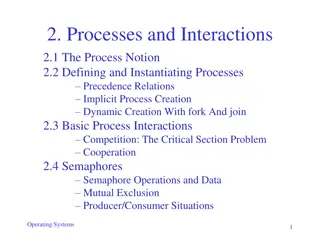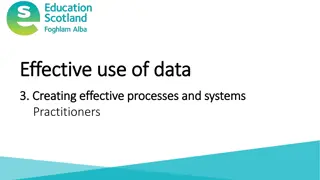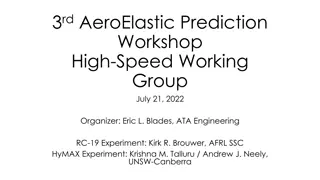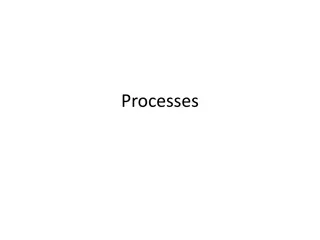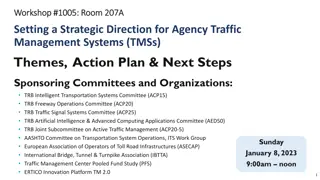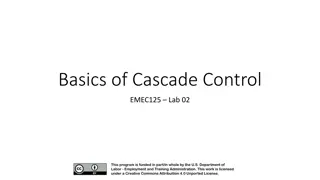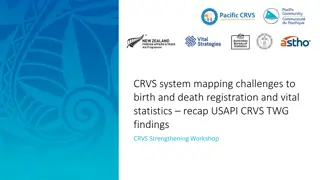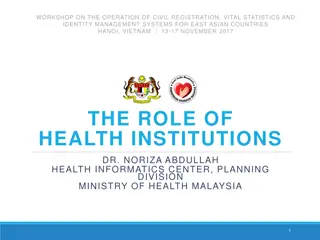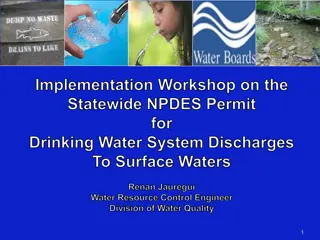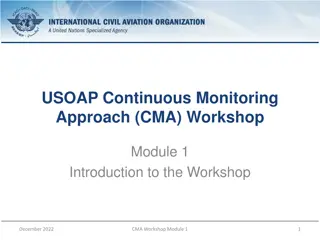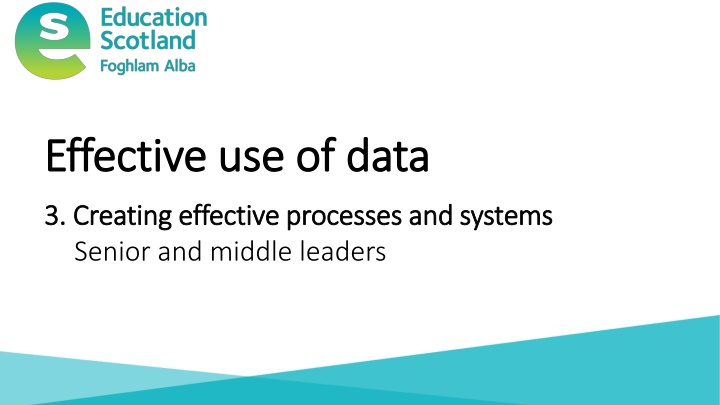
Effective Data Processes and Systems for Senior and Middle Leaders
Explore the importance of effective data processes and systems, including defining, implementing, and ensuring their efficacy within various scenarios. Learn from workshops covering national guidance, data systems, scenarios, and more to enhance professional learning.
Download Presentation

Please find below an Image/Link to download the presentation.
The content on the website is provided AS IS for your information and personal use only. It may not be sold, licensed, or shared on other websites without obtaining consent from the author. If you encounter any issues during the download, it is possible that the publisher has removed the file from their server.
You are allowed to download the files provided on this website for personal or commercial use, subject to the condition that they are used lawfully. All files are the property of their respective owners.
The content on the website is provided AS IS for your information and personal use only. It may not be sold, licensed, or shared on other websites without obtaining consent from the author.
E N D
Presentation Transcript
Effective use of data Effective use of data 3. Creating effective processes and systems 3. Creating effective processes and systems Senior and middle leaders
The national model of professional learning The national model of professional learning The national model of professional learning | Professional Learning | Education Scotland
Draft Group Agreement and Protocols Draft Group Agreement and Protocols Work together Learn from, with, and on behalf of each other Create a safe space to share ideas and build learning Agree that everyone is an equal and valued participant Remain in the room (emails and phone protocol).
Connector In groups/pairs: Share the grown-up job you thought you wanted to do when you were a child. TASK
Aims Aims In this workshop we will consider: the importance of effective data processes and systems what we mean by data processes and systems how to ensure data processes and systems are effective; and approaches to data processes and systems within different scenarios.
Content coverage National guidance and research Defining data processes Effective data processes Data systems Scenarios activity Reflection and feedback
Re Re- -cap cap In workshop 1 we looked at the purpose and use of data including: the meaning of data and evidence, the ways in which data is used and what we mean by big and small data. In workshop 2 we considered different categories of data and how these may be intersected to support improvement.
Rapid Evidence Review Paper Rapid Evidence Review Paper Section three of the Education Scotland Rapid Evidence Review on creating effective processes and systems highlights that: It is important to be clear which data to gather, how this collected and by whom. Data must be accurate, and procedures should be built in to allow data to be regularly checked and updated. Consideration must be given to how data collection or the data cycle fits into the improvement cycle. Tracking systems should be intuitive and minimise workload, but sophisticated enough to allow educators to explore patterns, trends and understand needs.
GTCS Standard for Middle Leadership GTCS Standard for Middle Leadership Self-evaluation 3.4.4 undertake regular and systematic review of a range of processes which enable colleagues to contribute to the overall monitoring and review of change through the improvement planning cycle. Standard for Middle Leadership
GTCS Standard for Headship GTCS Standard for Headship Self-evaluation 3.4.4 establish, sustain and review a range of strategic processes which enable colleagues to contribute to the overall monitoring and review of change through the improvement planning cycle. The Standard for Headship
How good is our school? (4 How good is our school? (4th th Edition) Edition) Challenge questions: How well do we use digital solutions to support the interrogation of data? (1.1) What range of data and information do we utilise to understand the social, economic and cultural context of the local community? (1.3) To what extent are our tools for change impacting positively on staff and improving outcomes for all learners? (1.3)
What are data processes? What are data processes? "The carrying out of operations on data, especially by a computer, to retrieve, transform, or classify information" Oxford Dictionary
What do we mean by data processes? What do we mean by data processes? Assessment data: Gathering information from tests, quizzes, and other assessments to evaluate learner's understanding and progress in specific subjects or skills. Census data: Inputting demographic learner information used to understand the progress and achievement of groups and individuals. Attendance records: Tracking learner's attendance to monitor regularity and identify potential issues with engagement, lateness or absence. Grading systems: Recording grades used to assess and analyse learner's achievement and inform instructional decisions.
LOVE THE PROCESS AND YOULL LOVE WHAT THE PROCESS PRODUCES Jon Gordon
Reflecting on data processes Reflecting on data processes Identify three or four different data processes that you have in school. How would you rate their effectiveness on a scale of 0-5 and why? Process Rating Reason
Developing effective data processes Developing effective data processes Before gathering data, it is important to consider why we need the information. It may help to ask: o What impact do we want the data to have? o How do we want to use the data? o Do we already collect this data in a way that we could easily use or adapt? Understanding why will help educators to develop appropriate data processes and reduce the risk of collecting data without a clear purpose.
Developing effective data processes Developing effective data processes part 2 part 2 It is important to consider who will be gathering the data and how the data will be stored. It may help to think about who will need access to the data, how often it will need to be collected and whether data needs to be recorded in a consistent way to support analysis. It is important to consider the accuracy of data. For example, it is difficult to analyse attainment data by demographic information if the information is incomplete or inaccurate.
A BAD SYSTEM WILL BEAT A GOOD PERSON EVERY TIME W E Deming
Data systems Data systems A system is a set of things working together as parts of a mechanism or an interconnecting network; a complex whole. A system is made up of people, processes and resources. In education there are many different data systems. Whole school examples might include tracking and monitoring of whole school attainment, attendance or wider achievement. At a classroom level, data systems might include tracking and monitoring interventions, tracking individual progress in a subject through a level or completing and analysing a class health and wellbeing survey.
Data systems Data systems - - part 2 part 2 A system may also refer to a specific database into which information is entered or a tool that supports data insight or analysis. There are many different databases used by schools and local authorities to manage data. INSIGHT is an example of system tool that is used across Scotland to analyse pupil attainment through the senior phase. The Scottish Index of Multiple Deprivation (SIMD) is a national tool that provides information on geographical areas of least and most deprivation across Scotland.
Effective tracking and monitoring systems Effective tracking and monitoring systems Education Scotland have developed a resource to support schools in developing effective tracking and monitoring systems. The link can be accessed through the QR code. Resources to support effective tracking and monitoring | Resources | Education Scotland
Scenarios Activity Scenarios Activity Pick one of the scenarios below and discuss in your groups: 1. I am a principal teacher of guidance. I need to monitor my allocated pupil data. How can I effectively collect, process and analyse data about health and wellbeing, academic performance and attendance? 2. I am a depute headteacher. I need to collect and analyse data to see if our S4 attainment is on track. How can I do this effectively? 3. I am a principal teacher. I need to collect and analyse data regarding the performance of pupils in my secondary department or for literacy/numeracy attainment across my primary school. How can I do this effectively? 4. I am a headteacher. I need to collect and analyse attendance data to understand the reasons our data is below our local and national comparator. How can I do this effectively?
Aims review Aims review In this workshop we will consider: the importance of effective data processes and systems what we mean by data processes and systems how to ensure data processes and systems are effective; and approaches to data processes and systems within different scenarios.
Individual Reflection Individual Reflection Think about the things we have covered today. Why are data processes and systems important? Are there any actions you can take in your school or setting to make your data processes and systems more effective?
Feedback Feedback Insert you own evaluation code here

